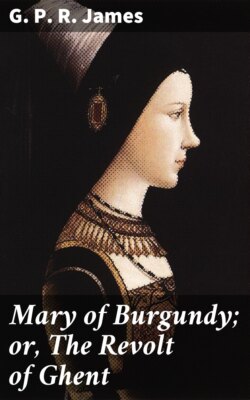Читать книгу Mary of Burgundy; or, The Revolt of Ghent - G. P. R. James - Страница 3
На сайте Литреса книга снята с продажи.
INTRODUCTION.
ОглавлениеGeorge Payne Rainsford James, Historiographer Royal to King William IV., was born in London in the first year of the nineteenth century, and died at Venice in 1860. His comparatively short life was exceptionally full and active. He was historian, politician and traveller, the reputed author of upwards of a hundred novels, the compiler and editor of nearly half as many volumes of letters, memoirs, and biographies, a poet and a pamphleteer, and, during the last ten years of his life, British Consul successively in Massachusetts, Norfolk (Virginia), and Venice. He was on terms of friendship with most of the eminent men of his day. Scott, on whose style he founded his own, encouraged him to persevere in his career as a novelist; Washington Irving admired him, and Walter Savage Landor composed an epitaph to his memory. He achieved the distinction of being twice burlesqued, by Thackeray, and two columns are devoted to an account of him in the new "Dictionary of National Biography." Each generation follows its own gods, and G. P. R. James was, perhaps, too prolific an author to maintain the popularity which made him "in some ways the most successful novelist of his time." But his work bears selection and revival. It possesses the qualities of seriousness and interest; his best historical novels are faithful in setting and free in movement. His narrative is clear, his history conscientious, and his plots are well-conceived. English learning and literature are enriched by the work of this writer, who made vivid every epoch in the world's history by the charm of his romance.
The great passage in this book is so magnificently dramatic that James feels it due to his conscience as an historian to apologise for its excellence in a footnote. "It may be necessary," he writes at the foot of page 234, "to inform those who are not deeply read in the chronicles of France that this fact is minutely accurate." We are glad of the reminder, for without it the reader might have thought that here was something fictitious, or at least exaggerated and 'worked-up,' so intense and true is the tragic setting of the scene. But if Mary of Burgundy's bearing at the execution of the Lord of Imbercourt, and her grand historical utterance, recorded on page 305, "You have banished my best friends, and slain my wisest counsellors, and now what can I do to deliver you?" if these public appearances of the heiress of Charles the Bold, and the love which she cherished for the husband who was chosen for her on political grounds, justify James in raising her to the title-role in this romance, it must be conceded that the real hero is Albert Maurice, citizen of Ghent, a noble mediæval prototype of the citoyens of the French Revolution, Whatever defects in character-study have been ascribed to James, no one can deny that in Albert Maurice his skill was equal to its material. The figure of the young President is firmly and consistently drawn, and the conception touches considerable heights of human daring and aspiration. Albert Maurice at the time of his fall was many years younger than Wolsey, but he could say as genuinely as the Cardinal, "I charge thee, fling away ambition!" In his story we realize to the full the tragic import of that warning. His splendid dream of patriotism was fulfilled by blunders and crimes, committed per se or per alios, for which he felt the responsibility, and at the end the people of Ghent discovered the ancient truth, that worse than the tyranny of tyrants is the tyranny of tyrannicides. But by that time Maurice was dead; the victim of self-delusion would not survive his disappointment; in the sudden knowledge that his goal was unattainable, he became aware that his steps to it had been unjust. This romance of the fifteenth century--Mary of Burgundy was married in 1477--is in what Matthew Arnold called the "grand style," and it is therefore singularly free from faults of diction and false notes of any kind. It has a certain attractive naturalness from beginning to end, and it is one of the best, as it is one of the earliest, of the series of novels in which James went for his plots to the French Chroniclers of the Middle Ages.
